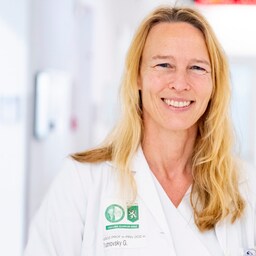Around 1.7 million euros
Gynecological cancer outpatient clinic in Graz to be renovated
The gynecological oncology outpatient clinic at Graz University Hospital will be renovated from the summer. Gynecologist Gerda Trutnovsky hopes that better vaccination rates with HPV vaccinations will soon make themselves felt.
Diagnosis: cancer! If a woman is diagnosed with breast, cervical or ovarian cancer, she can be treated at the gynecological oncology outpatient clinic at Graz University Hospital. Women come here for chemotherapy and other therapies, before and after operations. "Most treatments take place on an outpatient basis, but we also treat inpatients if necessary," says Gerda Trutnovsky, who heads the outpatient clinic. "We provide care from the first diagnosis."
There have been plans for years to renovate the outpatient clinic, which has not been renovated for two decades. In August, the time has come, as Kages announced on the occasion of Women's Health Day: 1.67 million euros will be invested in expanding the treatment beds from five to nine and a more modern design. "Those who come for chemo won't have to wait so long," says Trutnovsky. "Examinations and discussions with our psychologist can take place at the same time."
Around 5,000 treatments have been carried out there each year to date, with more to come in the future. While breast cancer is still the most frequently treated form of cancer at the outpatient clinic, Trutnovsky hopes to be confronted with far fewer cases of cervical cancer in the future: "It's not quite there yet, but in Australia you can already see that cases are falling. Vaccination rates against HPV are much higher there."
The HPV vaccination always provides protection, but the earlier you get vaccinated, the better.

Gerda Trutnovsky
Bild: Med Uni Graz
Vaccination offer expanded
Since February 2023, HPV vaccination in Austria has been free until the age of 21 - in spring, the program was extended until the 30th birthday. 400 to 500 women are diagnosed with cervical cancer every year, 130 to 180 die from it. "The lead time is long," says Trutnovsky. "Ideally, children are vaccinated between the ages of 10 and 12, because that's when it works best. Cases of the disease occur from the age of 40."
However, vaccination against HPV also provides protection at a later age - the earlier, the better. From the age of 30, the gynecologist recommends an HPV test - anyone infected with the human papillomavirus should have regular check-ups. "The chances of survival always depend on the stage of the disease."
This article has been automatically translated,
read the original article here.











Kommentare
Willkommen in unserer Community! Eingehende Beiträge werden geprüft und anschließend veröffentlicht. Bitte achten Sie auf Einhaltung unserer Netiquette und AGB. Für ausführliche Diskussionen steht Ihnen ebenso das krone.at-Forum zur Verfügung. Hier können Sie das Community-Team via unserer Melde- und Abhilfestelle kontaktieren.
User-Beiträge geben nicht notwendigerweise die Meinung des Betreibers/der Redaktion bzw. von Krone Multimedia (KMM) wieder. In diesem Sinne distanziert sich die Redaktion/der Betreiber von den Inhalten in diesem Diskussionsforum. KMM behält sich insbesondere vor, gegen geltendes Recht verstoßende, den guten Sitten oder der Netiquette widersprechende bzw. dem Ansehen von KMM zuwiderlaufende Beiträge zu löschen, diesbezüglichen Schadenersatz gegenüber dem betreffenden User geltend zu machen, die Nutzer-Daten zu Zwecken der Rechtsverfolgung zu verwenden und strafrechtlich relevante Beiträge zur Anzeige zu bringen (siehe auch AGB). Hier können Sie das Community-Team via unserer Melde- und Abhilfestelle kontaktieren.